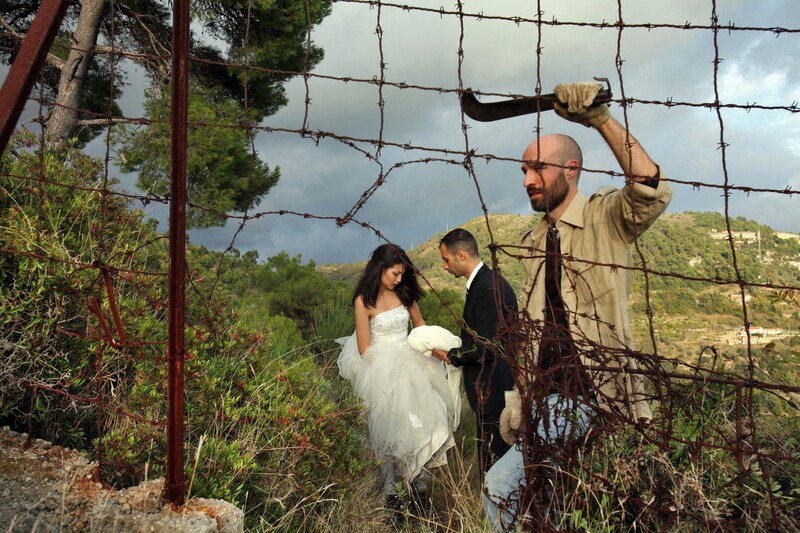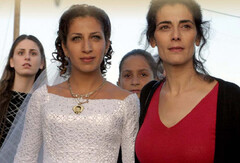The Electronic Intifada 7 April 2016

Five Palestinian and Syrian refugees seek a safe haven in On the Bride’s Side.
On the Bride’s Side directed by Khaled Soliman Al Nassiry, Antonio Augugliaro and Gabriele Del Grande (2014)
Millions have fled wars in Syria, Iraq, Afghanistan, Libya and other places to neighboring countries. Hundreds of thousands have smuggled themselves on to Europe on death-defying journeys, only then prompting the “refugee crisis” to dominate headlines in western media.
In its wake, there has been a surge in support for far right anti-immigration and Islamophobic politicians and parties. The specter of the 1930s looms large.
In this climate, On the Bride’s Side is a timely artistic and discursive intervention.
This is a deeply political documentary film. Its criticism of world governments for failing to deal with an emergency largely precipitated by ill-informed Western interference in the Middle East is implicit but strong. Yet it is not didactic or dull. It is a profoundly human film, full of love, laughter, poetry and wine. Its beautiful use of color and imagery makes its message all the more heartfelt.
It begins in October 2013, when an Italian journalist and two of his friends, both writers, meet for coffee at the train station in Milan. A young man overhears them speaking Arabic, and asks for directions.
It transpires that the young man, Abdallah Sallam, narrowly survived one of the many Mediterranean shipwrecks that have killed thousands of refugees in recent years, smuggled in overcrowded boats, desperately fleeing wars and misery at home.
Mission to Sweden
In the film, Abdallah speaks of being buried under bodies, trying to muster the energy to move his hand so that the crew of the Maltese boat onto which he had been dragged would know he was alive. He escaped drowning, he says at one point, only to almost suffocate under those who hadn’t.
Abdallah’s new friends commit themselves to helping him reach Sweden. As the state with some of the best (or least worst) conditions for asylum seekers, the Nordic country is the ultimate aim for many.
But that means getting across Europe, south to north, a challenge not just for Abdallah but also his European companions. Once the party of refugees reaches five, the Italians helping them technically face being arrested for people trafficking — which carries a 15-year sentence.
The answer? To fake a wedding party — and to take along film cameras, under the direction of another friend, film editor and director Antonio Augugliaro.
The wedding expedition is intended as an excuse and a diversion, distracting border guards and police with the bride’s vast white dress and the smart suits of the “groom” and “guests.”
Thus, and after having assembled the necessary costumes, cars and cameras, a party eventually comprising 23 people sets off on a four-day trip across Europe, traversing Italy, France, Luxembourg, Germany, Denmark and finally Sweden.
Human stories in confined spaces
This journey, and the human stories and relationships within it, forms the narrative of the film while the settings, from the Mediterranean Sea to Scandinavia, provide a beautiful and well utilized backdrop.
But most of the film takes place in the claustrophobic spaces of cars driving in convoy across a continent. Within these confines, we hear the stories of the refugees and those offering them solidarity and comradeship.
Tasnim, a Palestinian with German citizenship who had left Syria only a few months earlier and whose parents and grandparents were still in the Yarmouk camp and neighboring Damascus, agrees to go along as the “bride.”
At times smiling and joking in her billowing gown, she looks haunted when talking about conditions in Syria and the deaths of young friends.
“Death isn’t when you die, it’s when people close to you die,” she reflects of the toll the war has taken on her community.
Manar, meanwhile, is a bouncy teenager, an aspiring and talented rapper whose quiet, sad father, Alaa, describes being shot at by Egyptian police as they ran for the boats, then enduring hunger and thirst as they crossed the Mediterranean.
Their haunting tale is juxtaposed with Manar’s defiant, energetic hip-hop performances and his drive to write — trying, at one point, to figure out how to make “Copenhagen” rhyme and scan in his Arabic lyrics.
Along with Abdallah, Alaa and Manar, Ahmad Abed and Mona al-Ghabra, an elderly couple who were political dissidents in Syria, round out the group of refugees.
Not states, but people
They also have horrific tales to tell of their journey, not least their anguish at how people smugglers can demand thousands of dollars from those they will abandon to their deaths at sea.
“Can a man pay $1,000 for his death?” they ask, recalling a family they met who spent more than $13,000 to pay for the passage of a group of 13 — adults, children and a baby. All of them drowned.
Still, says Mona, “you really love life when you sense death.” It is a spirit which runs through the film, with its defiant insistence on survival.
It is Mona who sums up the depth of the Palestinian plight in this film. While the Syrians have experienced appalling suffering, those of Palestinian origin have a further layer of dislocation to deal with: they are often refugees two or three times over — from 1948, perhaps also from 1967 and now again.
Mona’s heartfelt wish that she and, even more important, her children, might be able to finally get citizenship evokes the pain of people who have never had a proper passport.
Even co-director Khaled, also Palestinian, cries when his Italian citizenship comes through. He insists that he knows that no state genuinely cares about its citizens — least of all those who come as asylum seekers and migrants. But he cannot help but be overcome by finally “belonging” somewhere, even if only in the most legalistic sense.
This tension between the theoretical duties of states — to offer asylum to refugees, to rescue those drowning in the Mediterranean — and their actual callousness and brutality is a constant theme throughout the film.
And, as On the Bride’s Side shows, it is not upon states but human beings — in their generosity, warmth and willingness to take risks — that we ultimately have to rely and from whom we have to draw hope.
Sarah Irving is author of a biography of Leila Khaled and of the Bradt Guide to Palestine and co-editor of A Bird is not a Stone.





